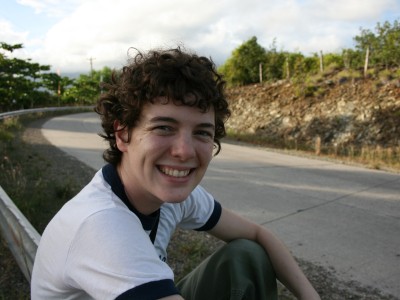Holly, I love “Repco” for its tragicomic elements, especially for how the narrator (AJ) reveals his own pain and loss against the unlikely backdrop of accompanying his love-struck buddy Seth to a V8 supercars event. How did this story come to you? Did it arrive fully structured, fully formed in your consciousness, or did it take several passes before it was complete?
Several years ago, my then-partner left me and, strangely enough, I found myself hanging out in Auckland with her brother (who I’d barely known before), whose long-time partner had also just left him. He’s a car guy, and the initial break-in back-story is one I developed while sitting around with his mates drinking cheap bourbon and listening to their car talk and “one time I got drunk and…” stories. The rest of it sprang from the realization, six months later when I was in the States, that something like this really could happen in NZ. In the US, if you see an attractive or intriguing person in a magazine or on television, he or she stays on the other side of that media divide.
But New Zealand is so small and interconnected that Kiwis are rarely more than two or three degrees apart, and the line between “world-famous-in-New-Zealand” and normal person, or between knockout beauty and Average Joe from Ashburton, is much more permeable. And that’s interesting because it levels the playing field somewhat, and an unusual kind of social mobility is possible. But while it’s freeing in the sense that it enables relationships between people you might not expect, it also means you have fewer excuses for not trying.
But, of course, the ending is inevitable: just because people are more accessible doesn’t mean they exist in reality as the objects of your fantasies. In a way, the woman in the magazine who you never meet is the one you get to keep, while the one you do meet is the one who has a personality independent of your desires and the one who can gaze back at you and make her own assessments.
You are a poet as well as prose writer. Are they ever fighting each other for creative space in your writing week?
I tend to write poetry and prose in separate blocks of a few months or more. In my poetry, I’m always checking a tendency toward too much narration, so when I was working on my MFA poetry collection, for example, I didn’t write or even read any fiction for the better part of a year. It’s difficult because novels are my go-to downtime entertainment, but reading them changes the way my brain wants to put together poems.
How do you like your work with 826michigan? Does New Zealand have anything similar to 826?
I can’t speak to all of NZ, but I am unaware of anything there that’s like 826, though many of the public libraries host excellent teen and youth writing events for things like poetry month and NZ book month.
I love working with 826michigan. I arrived in Ann Arbor nine months ago, knowing no one except my partner, and, as I’m also self-employed, I had few occasions to make friends. I was very lucky to stumble on 826. Not only have I gained a welcoming and hilarious group of friends in 826michigan’s amazing team of staff and volunteers, but I also get to witness, daily, what “making learning fun” looks like when it’s not a cliché but an endlessly energetic, inventive, and positive mission that’s constantly shooting off in new directions powered by the enthusiasm of both students and volunteers/staff.
Over the last year, I’ve had the opportunity to teach Olympic-themed creative writing sessions to elementary age students at summer programs for low-income communities, lead teen poetry drop-ins at the public library, and oversee field trips in which elementary school classes come to our lab to play a life-sized poetry board game or save the day (and ostensibly our jobs and their childhoods) by writing a story on the fly to foil our evil editor. This is not your class workbook of writing prompts. It’s something new every day, and I’m always excited to see what will come next.
You live in Ann Arbor and have degrees from both the U.S. and New Zealand. I’m curious to know how they differed, or were similar, in their approaches and in their strengths.
What’s most different about an MFA in creative writing in the US as compared to the one I did at the University of Canterbury is that I had no coursework. Instead, the process was more similar to the candidacy years of a PhD. I developed my own topics for both the creative and scholarly theses, but I also had a brilliant advisor who read every word I wrote and kicked my ass right through to the end of the process. I am very self-motivated in terms of both writing and independent research, so this approach worked well for me, but I did miss the writing community I might have had if I’d chosen to do my MFA in the States.
Having taken a year of undergraduate English and philosophy classes at the University of Otago in NZ, I can also comment that the biggest difference I observed between undergraduate education in NZ versus the US is that American students have been encouraged throughout their entire lives to speak up in class, share their ideas, and feel comfortable doing so. In my courses in NZ, the professor would ask a question, and the only students with their hands in the air were inevitably the American study abroad students. The Kiwi students were equally capable and, in smaller discussion sections, were more likely to talk about the readings and their own thoughts, but the culture in NZ primary and secondary school classrooms is much less about standing out or being a “tall poppy.” (“The tall poppy gets cut down” is a phrase I’ve never heard used in the US but is familiar to all Kiwi students.)
For your business, Hire a Poet, you write occasional poetry. How have you enjoyed the process?
It’s a lot of fun. I get emails from people all over the world, commissioning me to write poetry for various occasions. It’s quite entertaining to read their stories, and it means I get to answer “Yes” to a question I often get, which is “Can you make any money as a poet?” It’s true that this generally isn’t my best poetry in terms of artistic achievement, but on the other hand, I’m taking on a creative brief and applying my skills to a specific situation that has specific requirements, which can be a great exercise. In addition, I feel good about making poetry relevant to the lives of individuals, as there aren’t so many readers as there once were. And finally, no one ever commissions me to write a hateful poem. People want to tell their friends and loved ones that they appreciate them and value them and love them, and I get to help deliver that message.
How much do you need to know about the sender and the recipient in order to create your poem?
I ask for quite a bit of information. The point of commissioning a poem rather than finding one on the internet is that it’s personal, and if I don’t get enough details, or if I don’t understand the nuances of the situation, then it comes out generic and bland. So I generally ask the sender to explain the circumstances surrounding the poem, their relationship to the recipient, and any other details that will help me make it specific and personal. Finally, I ask them to tell me, as precisely as they can, what it is they want to convey through the poem.
My all-time favorite assignment (so far) was from an office worker who wanted me to write a poem from the perspective of the porcelain chicken on top of his desk, which he’d acquired as the white elephant gift at the office holiday party the year before. When passing on the chicken at the next holiday party, he wanted to include for the chicken’s next owner a poem that recounted the chicken’s impressions of the year. He sent me not only details on himself and his co-workers (for a bit of light roasting), but also photos of his office and the top of his head that he took from the chicken’s eye-level.
What is currently trending—sadder works, or happier ones?
Love. People want (or want to give) love poems. Some are wooing poems, some are anniversary or birthday poems, some are “missing you” poems, some are apology poems. But probably three-quarters of the requests I get are for love poems of some kind. By and large, it’s men requesting love poems for women, which is actually something I feel very comfortable tackling, as someone who is both a woman and primarily attracted to women. I understand what the senders want to communicate, but I also know when sending that message is going to be a little too much or likely to come off as creepy rather than sweet.
I was particularly stoked to read your three poems in Spork Press: “The day will be beautiful,” “Turn Back Your Clocks,” and “Save Radio New Zealand.” Did they save Radio New Zealand? [I hope so.] And…will you someday publish a book-length volume of your poems?
Radio New Zealand remains up and running. About three years ago, RNZ faced significant financial difficulties and there was debate in Parliament and in the news as to what would have to be cut (FM service outside of Auckland, overnight programming, etc) as a result of a government funding freeze on publicly owned radio stations. Fortunately RNZ survived the freeze and continues to operate 24 hours a day, with stations for music, national and international news, and Maori language programming.
I hope to publish a volume of my poetry soon. I am in touch with several university publishers in NZ, and I hope to publish my MFA manuscript over there. I have also written a collection of fifty sonnets about awkward words (e.g., moist, gesticulate, supple), titled Awkwords, as well as an English-to-English translation of the Beach Boys’ top 40 hits, which I call My Pet Sounds Somewhat Different. I am seeking publishers for these two collections in the United States.



